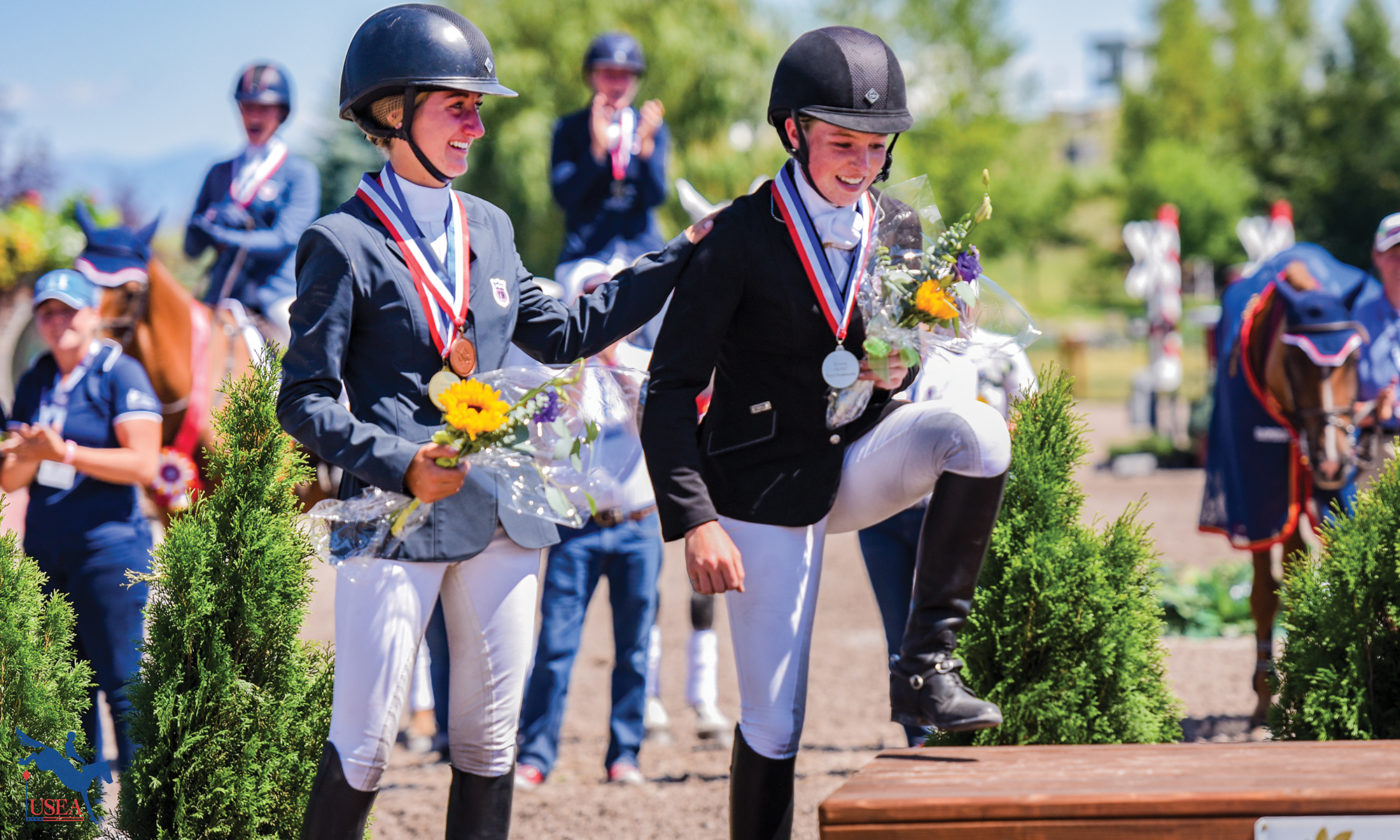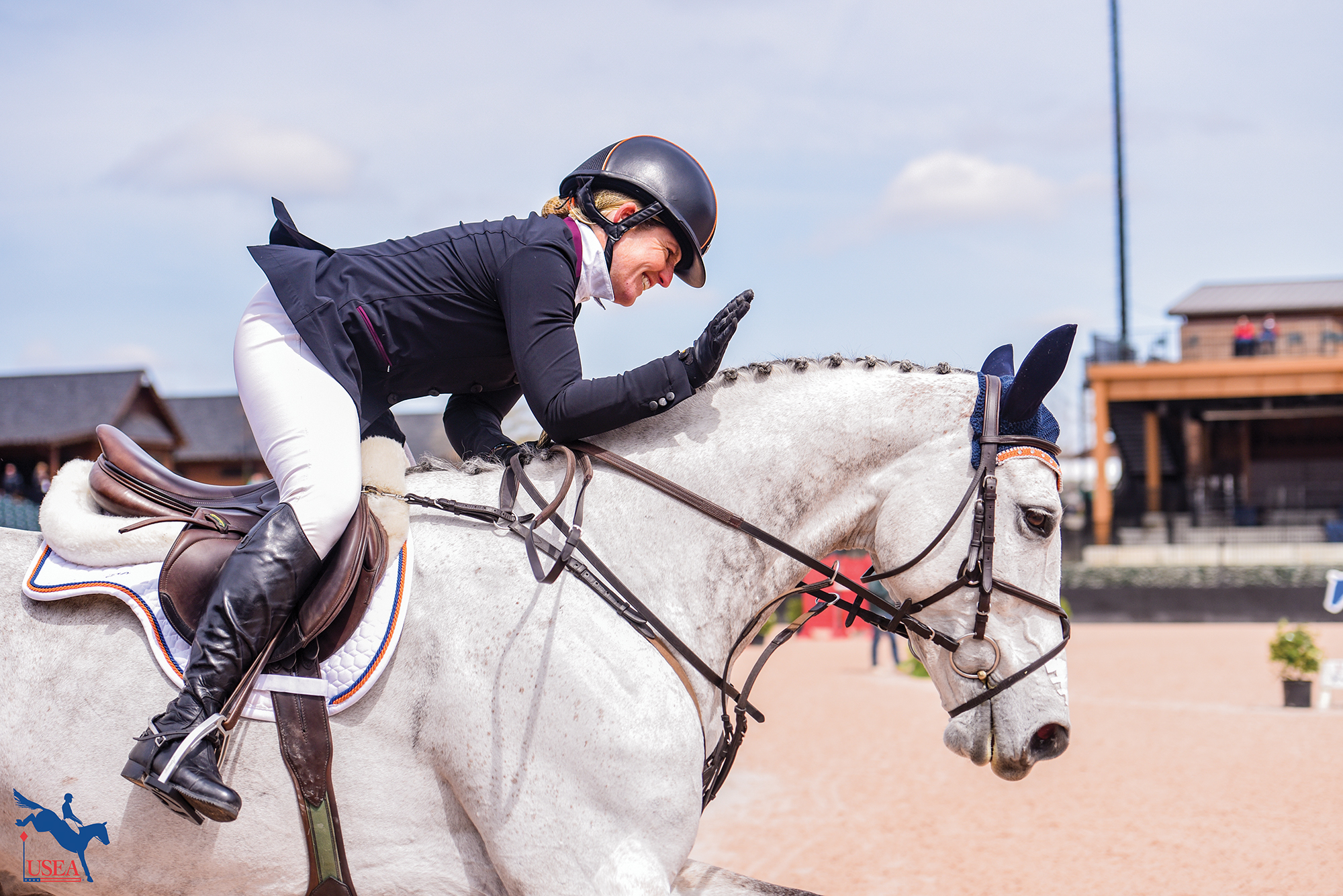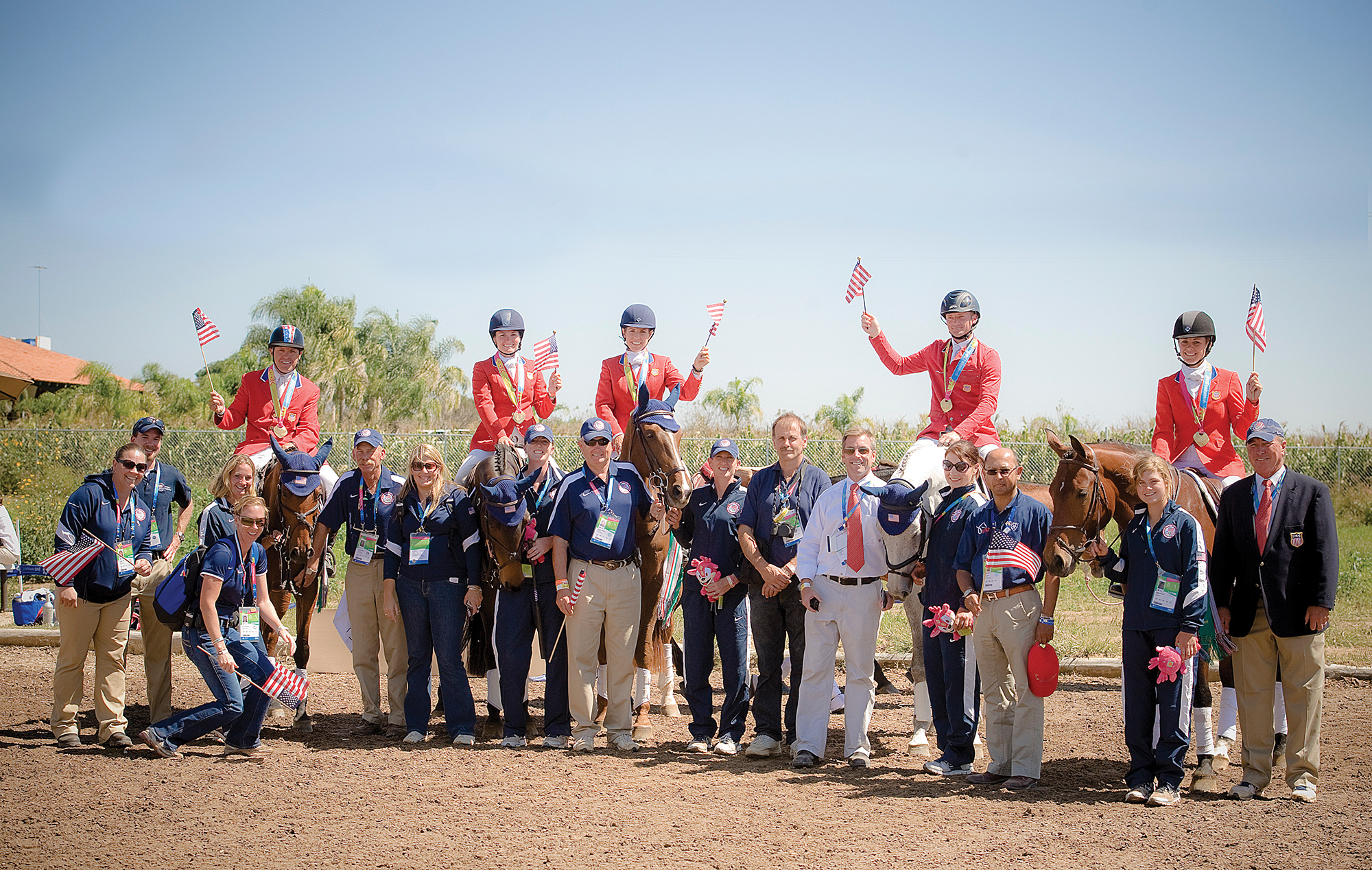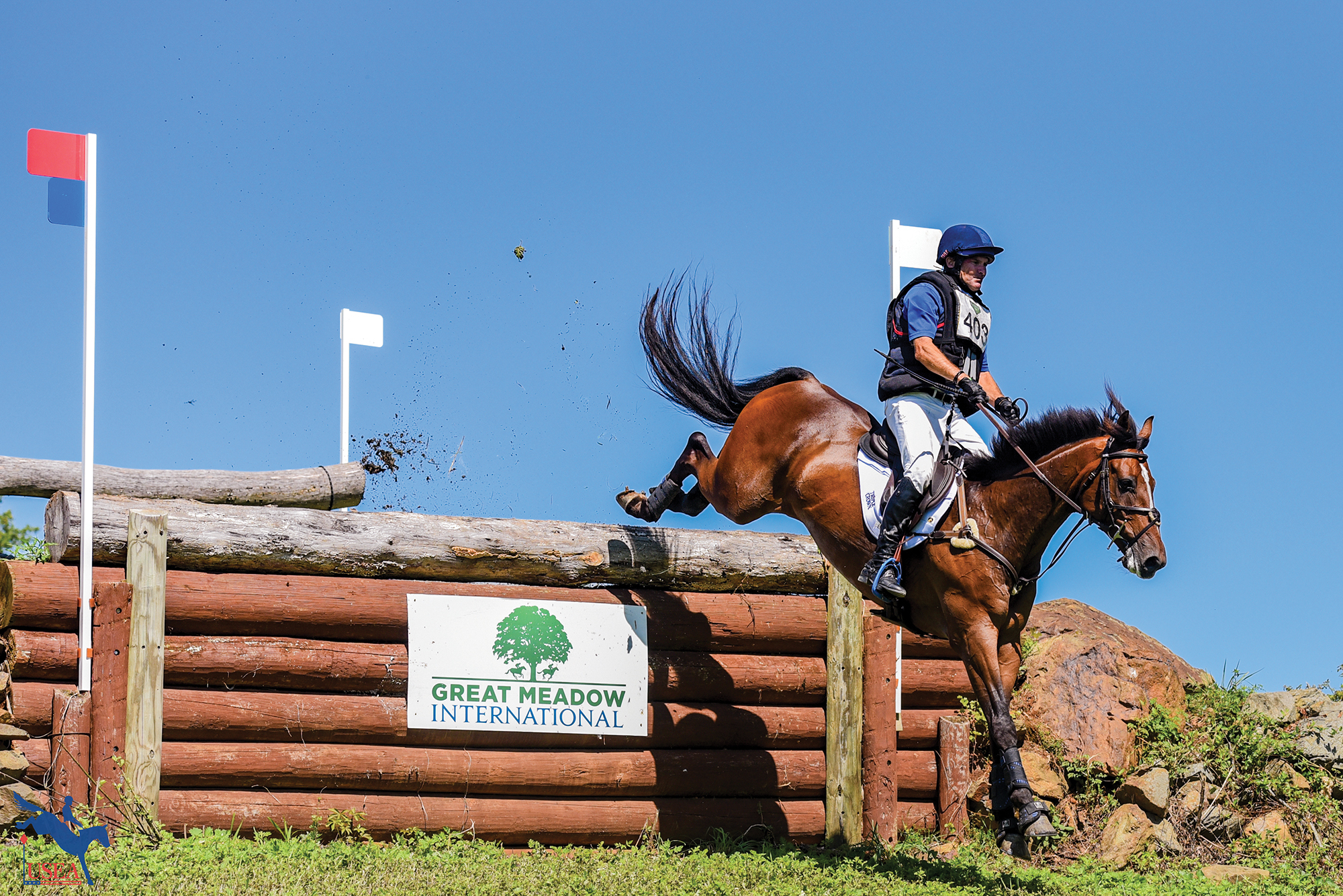

This article originally appeared in the September/October 2020 issue of Eventing USA magazine.
Sportsmanship
/ˈspôrtsmənˌSHip/
noun
1. Fair and generous behavior or treatment of others, especially in a sports contest.
2. Conduct (such as fairness, respect for one’s opponent, and graciousness in winning or losing) becoming to one participating in a sport.
Cooley On Show could have won his first international event with longtime partner Sharon White last year at the Ocala Jockey Club CCI4*-L. White went into the final day sitting in fourth place after cross-country. The rails came down in almost every show jump round before hers, but she was riding a horse that had jumped double clear in show jumping in his last six international competitions. She thought going into the grass ring at the Ocala Jockey Club would be no different. She jumped the first four jumps with ease and remembers hearing the bell ring and thinking it was a mistake. After the third time the officials rang the bell mid-course, she knew something was wrong.
White had accidentally started the show jumping course before the buzzer was sounded and was eliminated. “It felt like someone shot through my heart with an arrow. I had to give my horse a pat and leave. That was devastating because it was all on me. That is a rule I know. It’s probably my ten thousandth show jumping round I’ve done. There is no one you can look to but yourself in that moment of time,” said White.

“Last year was a tough year for me,” said White as she looked back at 2019. In April 2019, she retired Cooley On Show on cross-country at the Land Rover Kentucky Three-Day Event after an uncharacteristic refusal at the water. Later that year came the Ocala Jockey Club elimination. “You really have to dig deep, and it was not easy, but you can take every hardship and it’s how you think about it. Everybody is going to have hardships. The worst thing can happen to you but there is an opportunity in that. There is an opportunity to become a better person, rider, horseman, and to learn something from it and move forward.”
Moving forward she did, and in 2020 White earned her first international win with Cooley On Show at the Red Hills International CCI4*-S and won the CCI3*-L at Great Meadow International with Claus 63. Whether she’s having a tough time or is on top, White always has a smile on her face.
White’s overall positive outlook has earned her countless sportsmanship awards in the sport of eventing, but the one she treasures most is the Philippa Humphreys Memorial Sportsmanship Award she received in 2017 at Jersey Fresh International. “It’s near and dear to my heart because it’s about someone’s life. It was a great honor and that award means the most to me,” said White. The Philippa Humphreys Memorial Sportsmanship Award is presented in honor of Philippa Humphreys each year to a rider who demonstrates fairness, respect and responsibility; selfless equine management; passion and commitment for the betterment of eventing; and outstanding mentorship and relationship skills.
The Philippa Humphreys Memorial Sportsmanship Award recipient described her perspective on sportsmanship. “Good sportsmanship is being a good human being, which is important because it makes you happier. [It’s about] understanding that it doesn’t always go the way you want but you should always put your best foot forward. You’ve done your best, your horse has done his best, and the people around you have done their best.”
White has learned her way in the sport through several coaches including Jim Wofford, the three-time Olympian and one of the best-known eventing trainers in the world today. Wofford has had at least one student on every U.S. Olympic, World Championship, and Pan American team since 1978. Wofford explained, “Sportsmanship in eventing is the golden rule in the saddle: do to others as you would have done to you. When you are in the lead going into show jumping and you have a rail and someone else wins, you have to congratulate them. You had a rail and the person in second place didn’t, so they won.”
Jonathan Elliott, another active figure in the eventing community, said, “I think our sport is similar to golf where most of the time you compete against yourself. I believe, in general, you are against yourself and I think sportsmanship comes from appreciating what others do over the same course and recognizing when they do a good job.”
“In the end, we all have the same opportunity. Everybody goes over the same bit of ground and everybody jumps all of the same jumps,” said Elliott, who has competed up to the five-star level, coached top riders, is the organizer of the Aspen Farm Horse Trials, is a U.S. team selector, and currently sits on the USEA Board of Governors as the Vice President of Competitions.
It’s more than just wishing someone congratulations at a competition, it’s more than having a smile around the barn – it’s a certain “attitude and persona,” said Wofford; it’s “all-encompassing” said Elliott; it’s “being a good human” said Dayna Lynd-Pugh; and it’s “multifaceted” said Shannon Lilley. But, why is it important in the sport of eventing?
While 2020 has seen its fair share of challenges, now more than ever the eventing community will need to uphold its reputation of having a good sportsmanship atmosphere. Wofford explained, “Good sportsmanship creates a more accepting and comfortable atmosphere for new riders. Considering what we’re going through this year, it’s going to be important in the coming years that we grow and reestablish this sport on a sound financial basis and that requires active competitors. We depend so much on competition fees to fund the infrastructure. A sporting culture where good sportsmanship is the norm, that’s a place that all of us would like to exist in,” explained Wofford.
Wofford believes that doing the right thing is the essence of good sportsmanship. “I’ve counseled students that have had a refusal on cross-country but the jump judge did not count it as a refusal. I advised the rider to go to the Technical Delegate to describe what actually happened but that also meant they didn’t win. That’s a difficult scenario, but it’s about doing the right thing.”
From welcoming new riders into the sport to teaching the ones that are already in, Dana Lynd-Pugh believes being a good sport equates to being a good human. Lynd-Pugh is the owner, founder, and head trainer at Flying Tail Farms, a training program based in Gilroy, California that teaches students of every age and level of eventing. Lynd-Pugh is a USEA Level IV ICP Certified Instructor, has served on the USEA Board of Governors, was previously the team coach of Area VI Young Riders and Area VII Young Riders. Lynd-Pugh said, “I think in our sport people who display good sportsmanship always put their horse first, are ready to accept criticism, they don’t place blame, and they are grateful for every person behind them and their horse.”
What makes Lynd-Pugh the happiest is when she sees her students supporting one another at an event. “Nothing makes me more pleased than to see all of my students rooting for each other, stopping what they are doing to support another rider’s ride, and taking care of each other’s horses.”
These sportsmanship-like behaviors are instilled in her students as well as her children. Lynd-Pugh explained that her daughter, Kelly Pugh Goodman, the head rider at Flying Tail Farms, shows good sportsmanship behavior through her willingness to help her fellow competitors. “When Kelly is competing with her barnmates and she goes out on course first, she always comes back to the next rider and lets them know how the course rode, and what to watch out for. I think that’s really good sportsmanship because you are looking out for more than just yourself.”
For Lynd-Pugh, it’s important to be a good sport because “our kids look up to top athletes. So, we all have a responsibility to one another.”

Shannon Lilley was a member of the U.S. eventing team that won the team gold medal at the 2011 Pan American Games. Since then, she has developed Shannon Lilley Eventing around a similar team mentality. Shannon Lilley Eventing is based in Santa Cruz, California, and Lilley is the president of the Eventing Riders Association of North America, a committee member of the USEF Eventing Sport Committee, a USEA Level III ICP Certified Instructor, and the Chef d’Equipe for the Area VI Young Rider team. Lilley explained, “Good sportsmen work really well on a team. When I rode at the Pan American Games [in 2011], it was such a different feel. I have developed my business around that mentality. You’re not just in it for yourself, and you never are because you have a horse. There is so much community in eventing and there’s so much that goes beyond just yourself. If you can ride on a team of some sort, that helps teach you how to be a good sportsman.”
A panel of selectors pick athletes like Lilley to represent the U.S. on an international level, and Elliott, who is a current team selector for USEF, explained, “How someone conducts themselves is important and I think sportsmanship is a large part of that. It’s easy to put on a great face when you do well, but when it doesn’t go your way how do you handle it?”
An example of things not going to plan is when Boyd Martin was sidelined with an injury during the 2020 Great Meadow International. Phillip Dutton stepped in and offered to compete several of Martin’s top horses (Luke 140 and Blackfoot Mystery) in the CCI4*-S at Great Meadow International. “When you see Boyd can’t ride so Phillip sits on his horses and gives them a good school around a big track. I think that’s a key example of good sportsmanship,” said Elliott. “I think people are very willing to help each other out. For instance, you forgot your watch in cross-country warm-up, someone is willing to give you theirs.”

Elliott is not only a U.S. team selector, he is also the organizer of Aspen Farms. “As an organizer, I have some trainers that are excellent about teaching their junior riders to come find me and thank me for putting on the show. It’s something that’s super noticeable. Other people are very good about sending a handwritten letter. In the age of the Internet, to actually take the time to write a quick note goes a long way. As the organizer, I definitely notice it. We try to encourage that in our own students and it’s just the same willingness to lend a hand. In the end, I think of eventing as one big community.”
Another community is the online community, a communication platform where sportsmanship behavior is extended beyond the competition. Lilley commented, “What you show in your personal social media accounts is seen by everyone. I think how people see you is just as important as how you perform in the ring.” Elliott added, “On social media, it’s just as easy to show good sportsmanship behavior as it is to show poor sportsmanship behavior.”
While it is human nature to be frustrated with external circumstances, it is how a competitor reacts that helps determine the difference between a good sport and a poor sport. Elliott said, “Where I see poor sportsmanship is when people lay blame elsewhere other than on their own performance.”
“Poor sportsmanship, to me, is not taking personal responsibility,” said Lynd-Pugh. “When things don’t go well, it’s time to have an honest look at why – and sometimes people don’t want to do that. They want to blame the course designer, the dressage judge, they want to blame everyone but themselves. But, your best competitors are going to be honest with themselves.”
“If you have chucked your horse under the bus, then you are definitely a poor sport because I believe strongly that horses are doing their best all of the time,” said White. “I think horses don’t have a choice on how you handle them so therefore, it is your responsibility to deal with them really well, all of the time.”
Similar to White, Lilley explained, “I think the worst thing I see is when people take their frustration out on their horses. I think that’s a very clear example of poor sportsmanship. [Another example is] when people are upset after losing a top placing and they have a bad attitude about it or they are extra emotional publicly – there is a time and a place to be emotional but I don’t think publicly is the right time. I also think taking frustration out on the officials or having a bad attitude towards the officials is absolutely not okay and shows poor sportsmanship.”
“This sport is not easy, everyone would do it if it were. As a rider, you have to be better next time. That’s the theme of all of it. We, as riders, have to take our struggles and just get better. That’s our responsibility as a whole. Your responsibility is to be the best version of yourself that you can be,” continued Lilley.
For both Lilley and White, they have handled their struggles in the sport with a positive attitude. “If I get negative about something, it just doesn’t make me feel good,” said White.
Lilley said, “I’ve had a lot of ups and downs in this sport. There are horses that I’ve struggled with more than others. But, there’s always another day. The biggest thing is keeping perspective and looking for the positive in things and what you can learn from it. Because without failure, we don’t have success.”
White goes into each competition with the mindset that, “Your teammate is your horse and the competition is your competitor. You have to be the best in the eyes of the dressage judge, you have to conquer the cross-country course, and you have to show jump clean. If you do that, then you’re going to end up on top. Hopefully, everyone else is doing well too, because you are only going to be as good as the people around you, so the better the competitors, the better you will be.”
Did you enjoy this article? Want to receive Eventing USA straight to your mailbox? Members receive Eventing USA as part of their USEA Membership or you can purchase individual issues from the USEA Shop.
Great Britain’s Yasmin Ingham and Banzai du Loir found themselves in a familiar position today at the top of the leaderboard after dressage at the Defender Kentucky Three-Day Event, scoring a 26.0. A year ago, Ingham and “Banzai” led the field heading into cross-country after Friday’s dressage, but they drew an earlier start this year, and Ingham’s got a few more challengers to come tomorrow.
In comparison to many of his other upper-level event horses, Commando 3, or “Connor” as he is known in the barn, is still a newer ride for Boyd Martin, but that hasn’t held the pair back.
Are you following along with the action from home this weekend? Or maybe you're competing at an event and need information fast. Either way, we’ve got you covered! Check out the USEA’s Weekend Quick Links for links to information including the prize list, ride times, live scores, and more for all the events running this weekend.
Let the fun and games begin! This morning kicks off the official start of competition at the 2024 Defender Kentucky Three-Day Event (K3DE). The hefty four-star field is the first to set foot in the Rolex Stadium starting at 8:00 a.m. Last year we saw 49 four-star pairs in this division, but this year there are 63 pairs in the field.